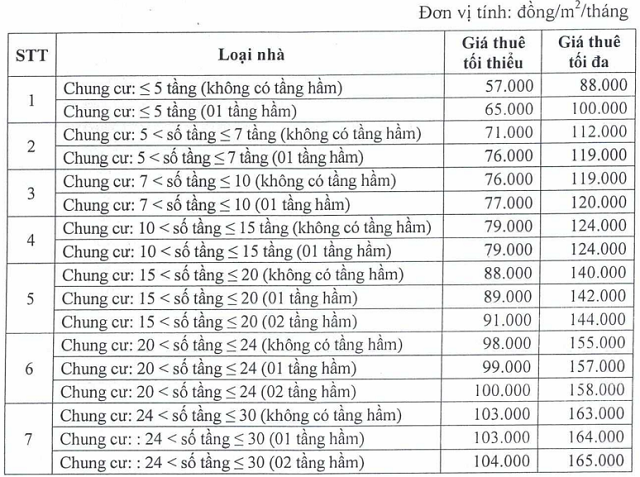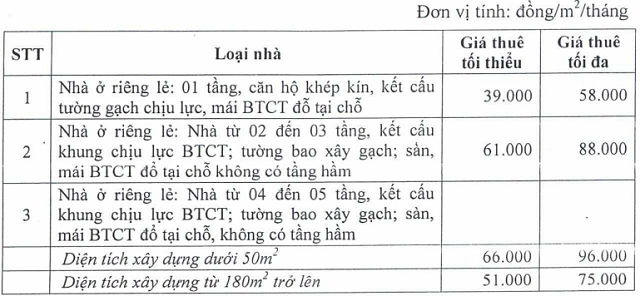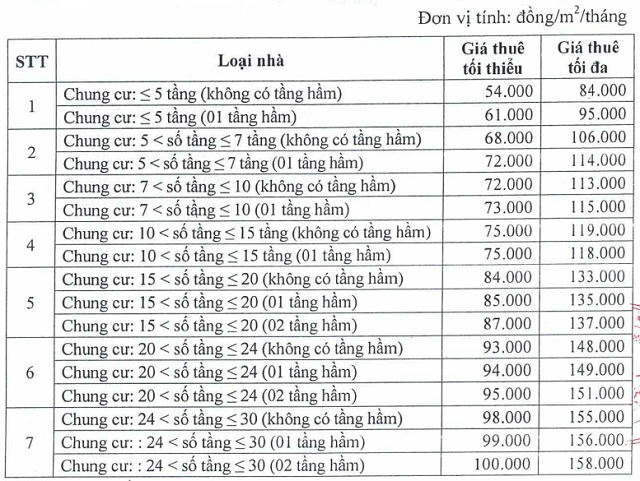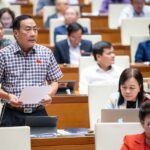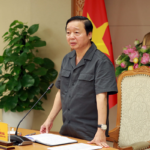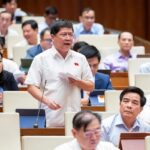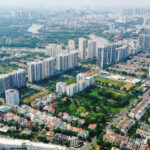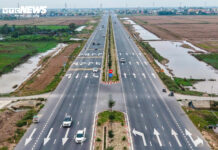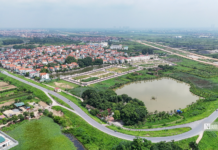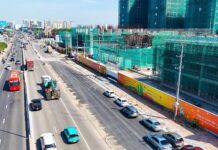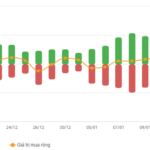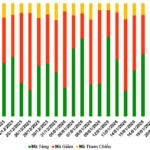On October 15, the People’s Committee of Da Nang City issued a decision on the framework for social and industrial park worker housing rental prices in the city, effective from October 25, 2024.
The minimum rent for social housing projects not invested with public capital or trade union finances is set at VND 57,000/m2/month, with a maximum of VND 165,000/m2/month, depending on the location and scale of the apartment building.
|
Rental price framework for social housing projects not invested with public capital
Source: People’s Committee of Da Nang City
|
For social housing built by individuals, the rent for a detached house (1-5 stories) ranges from VND 39,000 to VND 96,000/m2/month, depending on the scale of the house.
|
Rental price framework for social housing built by individuals
Source: People’s Committee of Da Nang City
|
Regarding worker housing in industrial parks, the rent for a 5-story apartment building (without a basement) is VND 54,000-84,000/m2/month. For a 25-30 story apartment building (with 2 basements), the rent starts from VND 100,000 and can go up to VND 158,000/m2/month.
|
Rental price framework for worker housing in industrial parks
Source: People’s Committee of Da Nang City
|
On the same day, the People’s Committee of Da Nang City also issued regulations on the subjects and conditions for renting, buying, and leasing social housing in the city, effective from October 25, 2024.
The prioritized subjects for social housing rental, which is invested and constructed by the state with public capital, include individuals with revolutionary contributions, family members of martyrs eligible for housing support, poor households with difficult circumstances, households renting public assets subject to demolition, and households whose land is revoked and houses demolished without state compensation in the form of land or housing. For other cases with difficult circumstances that do not meet some criteria for prioritized subjects or conditions for social housing rental as prescribed, the Da Nang City People’s Committee will consider and decide on the rental.
To be eligible for renting social housing invested and constructed by the state with public capital, the tenant must have a permanent residence registered continuously in Da Nang City for at least 5 years from the date of submitting the registration dossier. They should not have bought, rented, or leased social housing and must not have benefited from housing support policies in any form. Additionally, they should not own a house or land for residential purposes in the city.
For social housing that is not invested and constructed by the state with public capital, support will be provided for renting, buying, or leasing to subjects specified in Article 76 of the Housing Law.
The Local Real Estate Market: Where the Shortage Doesn’t Halt and the Surplus Doesn’t Sell.
“A thorough assessment of the local real estate markets is imperative to identify areas where there is a shortage of development and where there is an oversupply of properties that remain unsold.” This was one of the key messages conveyed by Deputy Prime Minister Tran Hong Ha during the Central Steering Committee meeting on housing policies and the real estate market, held on October 24th.
“Innovating Social Housing: Exploring Solutions for Individually-Built Rental Homes”
In the National Assembly session on October 28, alongside the proposal to reduce real estate prices through bonds, members of the National Assembly suggested that increasing the supply of social housing through encouraging individuals and households to build their own homes is a viable solution that warrants further research and consideration.
“Addressing the Soaring Property Prices: A Proposal to Tax Vacant Properties”
The Parliamentary Supervision Delegation recommends expediting the completion of research and proposing amendments and supplements to the tax laws. This includes the enactment of new legislation that introduces higher tax rates for individuals who occupy large land areas and own multiple residences, as well as for those who fail to utilize their land promptly or leave it abandoned.

